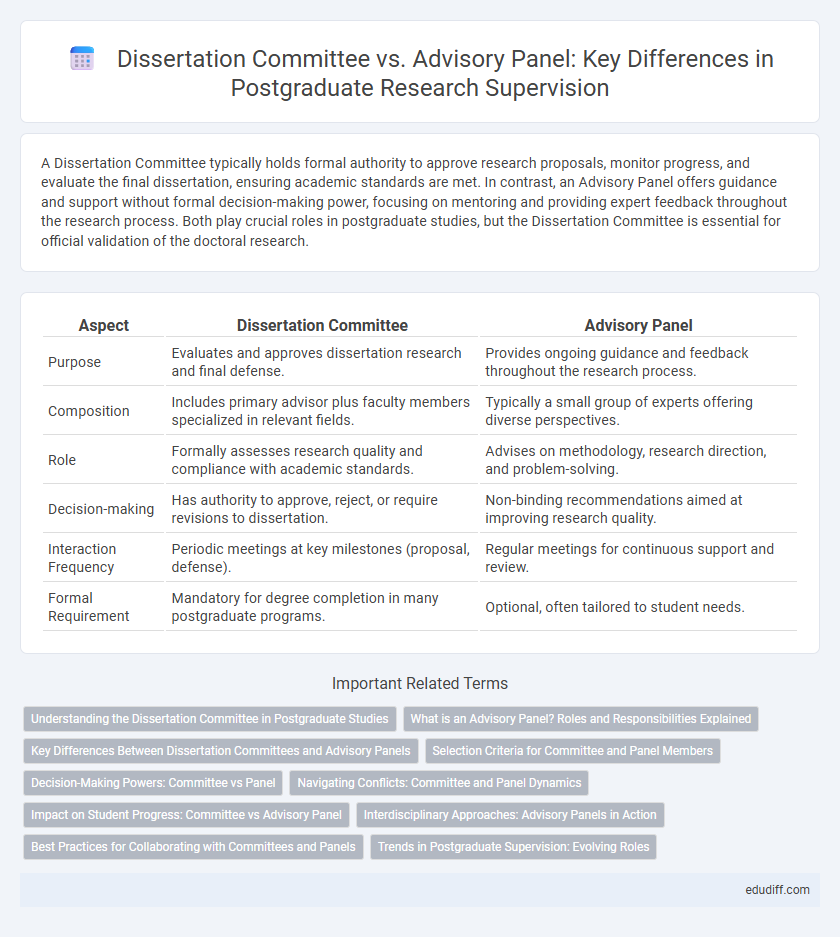A Dissertation Committee typically holds formal authority to approve research proposals, monitor progress, and evaluate the final dissertation, ensuring academic standards are met. In contrast, an Advisory Panel offers guidance and support without formal decision-making power, focusing on mentoring and providing expert feedback throughout the research process. Both play crucial roles in postgraduate studies, but the Dissertation Committee is essential for official validation of the doctoral research.
Table of Comparison
| Aspect | Dissertation Committee | Advisory Panel |
|---|---|---|
| Purpose | Evaluates and approves dissertation research and final defense. | Provides ongoing guidance and feedback throughout the research process. |
| Composition | Includes primary advisor plus faculty members specialized in relevant fields. | Typically a small group of experts offering diverse perspectives. |
| Role | Formally assesses research quality and compliance with academic standards. | Advises on methodology, research direction, and problem-solving. |
| Decision-making | Has authority to approve, reject, or require revisions to dissertation. | Non-binding recommendations aimed at improving research quality. |
| Interaction Frequency | Periodic meetings at key milestones (proposal, defense). | Regular meetings for continuous support and review. |
| Formal Requirement | Mandatory for degree completion in many postgraduate programs. | Optional, often tailored to student needs. |
Understanding the Dissertation Committee in Postgraduate Studies
The Dissertation Committee in postgraduate studies serves as a formal group of faculty members responsible for guiding, evaluating, and approving the research project to ensure academic rigor and adherence to institutional standards. Unlike an Advisory Panel, which may provide informal feedback and mentorship, the Dissertation Committee holds a decisive role in assessing the viability of the dissertation proposal, monitoring progress, and conducting the final defense. This committee's composition typically includes the principal supervisor and experts in the field, promoting comprehensive oversight and support throughout the doctoral journey.
What is an Advisory Panel? Roles and Responsibilities Explained
An Advisory Panel in postgraduate studies provides specialized guidance and expert feedback to support the candidate's research progress, offering diverse perspectives that complement the primary Dissertation Committee. Their roles include reviewing research proposals, advising on methodology, and ensuring academic rigor, thereby enhancing the quality and relevance of the dissertation. Unlike the Dissertation Committee, which formally evaluates and approves the thesis, the Advisory Panel acts as an auxiliary resource to foster academic development and address specific challenges during the research process.
Key Differences Between Dissertation Committees and Advisory Panels
Dissertation committees typically consist of faculty members responsible for evaluating the quality and rigor of a postgraduate student's research, providing formal approval before progressing to final defense. Advisory panels serve as a more informal support system, offering guidance, feedback, and mentorship throughout the dissertation process without necessarily having the authority to approve the work. The key difference lies in the committee's evaluative role versus the panel's consultative function in postgraduate research supervision.
Selection Criteria for Committee and Panel Members
Selection criteria for dissertation committee members emphasize subject-matter expertise, academic qualifications, and prior experience in supervising graduate research to ensure rigorous evaluation standards. Advisory panel members are chosen based on their interdisciplinary insights, industry connections, and ability to provide diverse perspectives that complement the candidate's research objectives. Both groups require demonstrated commitment to scholarly integrity and effective communication skills to support the postgraduate researcher's development.
Decision-Making Powers: Committee vs Panel
The Dissertation Committee holds formal decision-making authority over key aspects such as approval of proposals, defense outcomes, and final submission decisions, guiding the candidate through academic requirements with binding power. In contrast, the Advisory Panel primarily provides expert advice and feedback without the power to make binding decisions, serving as a consultative body to support research development. Understanding the distinction emphasizes the Committee's crucial role in evaluation and formal academic judgment compared to the Panel's supportive, non-decision-making function.
Navigating Conflicts: Committee and Panel Dynamics
Dissertation committees and advisory panels play crucial roles in postgraduate research supervision but differ in authority and function, affecting how conflicts are navigated. Dissertation committees have formal decision-making power over research approvals and thesis evaluation, often requiring members to mediate disagreements through structured meetings and voting processes. Advisory panels serve as consultative bodies providing feedback without direct decision authority, necessitating open communication and consensus-building to manage conflicts effectively.
Impact on Student Progress: Committee vs Advisory Panel
A Dissertation Committee plays a critical role in directly influencing student progress by providing structured oversight, timely feedback, and formal approval at key stages, ensuring adherence to academic standards. An Advisory Panel offers more informal guidance and mentorship, facilitating flexible support that can adapt to the student's evolving research needs but may lack the authoritative power to enforce deadlines or milestones. The presence of a Dissertation Committee typically correlates with clearer progression benchmarks and accountability, contributing to more consistent advancement in postgraduate research programs.
Interdisciplinary Approaches: Advisory Panels in Action
Advisory panels in interdisciplinary postgraduate research foster collaboration among experts from diverse fields, enriching the dissertation with multiple perspectives and innovative methodologies. These panels guide the candidate to integrate complex concepts, ensuring the research addresses multifaceted problems with a holistic approach. Unlike traditional dissertation committees, advisory panels emphasize dynamic interaction and flexible mentorship tailored to the evolving needs of interdisciplinary projects.
Best Practices for Collaborating with Committees and Panels
Effective collaboration with dissertation committees and advisory panels relies on clear communication of goals, expectations, and timelines. Regularly scheduled meetings and proactive feedback integration enhance the quality of research and ensure alignment with academic standards. Establishing mutual respect and understanding roles within the committee or panel fosters a supportive environment conducive to timely dissertation completion.
Trends in Postgraduate Supervision: Evolving Roles
Dissertation committees increasingly integrate interdisciplinary experts to enhance research quality and innovation, reflecting a trend toward collaborative mentorship in postgraduate supervision. Advisory panels, offering broader academic and professional guidance, support holistic development beyond the dissertation, aligning with expanding student needs in diverse career pathways. Both structures evolve to balance specialized oversight with flexible, student-centered support, highlighting the dynamic shift in postgraduate education models.
Dissertation Committee vs Advisory Panel Infographic

 edudiff.com
edudiff.com